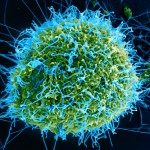Link to Pubmed [PMID] – 24847315
Front Microbiol 2014;5:195
DNA polymerases are versatile tools used in numerous important molecular biological core technologies like the ubiquitous polymerase chain reaction (PCR), cDNA cloning, genome sequencing, and nucleic acid based diagnostics. Taking into account the multiple DNA amplification techniques in use, different DNA polymerases must be optimized for each type of application. One of the current tendencies is to reengineer or to discover new DNA polymerases with increased performance and broadened substrate spectra. At present, there is a great demand for such enzymes in applications, e.g., forensics or paleogenomics. Current major limitations hinge on the inability of conventional PCR enzymes, such as Taq, to amplify degraded or low amounts of template DNA. Besides, a wide range of PCR inhibitors can also impede reactions of nucleic acid amplification. Here we looked at the PCR performances of the proof-reading D-type DNA polymerase from P. abyssi, Pab-polD. Fragments, 3 kilobases in length, were specifically PCR-amplified in its optimized reaction buffer. Pab-polD showed not only a greater resistance to high denaturation temperatures than Taq during cycling, but also a superior tolerance to the presence of potential inhibitors. Proficient proof-reading Pab-polD enzyme could also extend a primer containing up to two mismatches at the 3′ primer termini. Overall, we found valuable biochemical properties in Pab-polD compared to the conventional Taq, which makes the enzyme ideally suited for cutting-edge PCR-applications.

